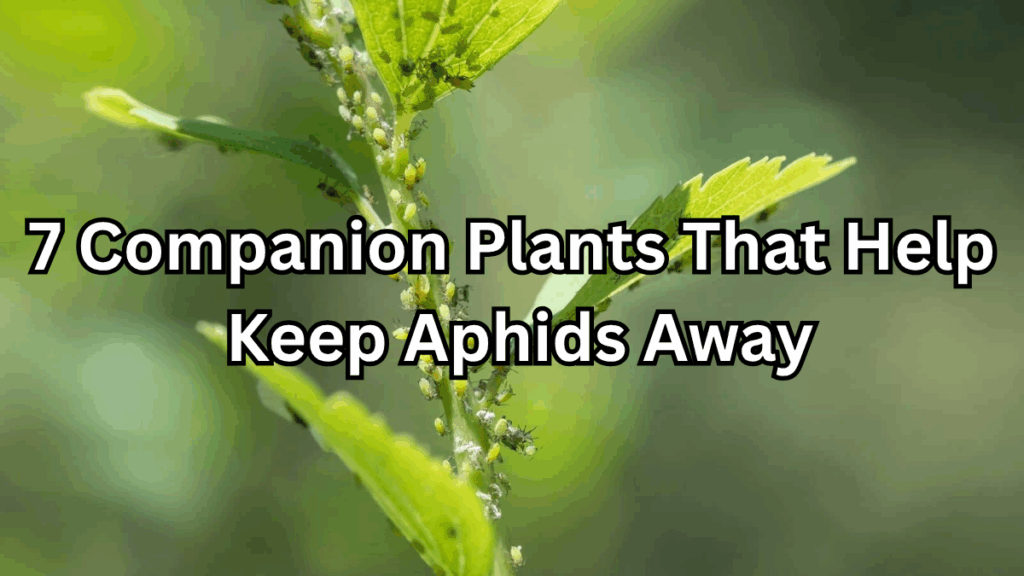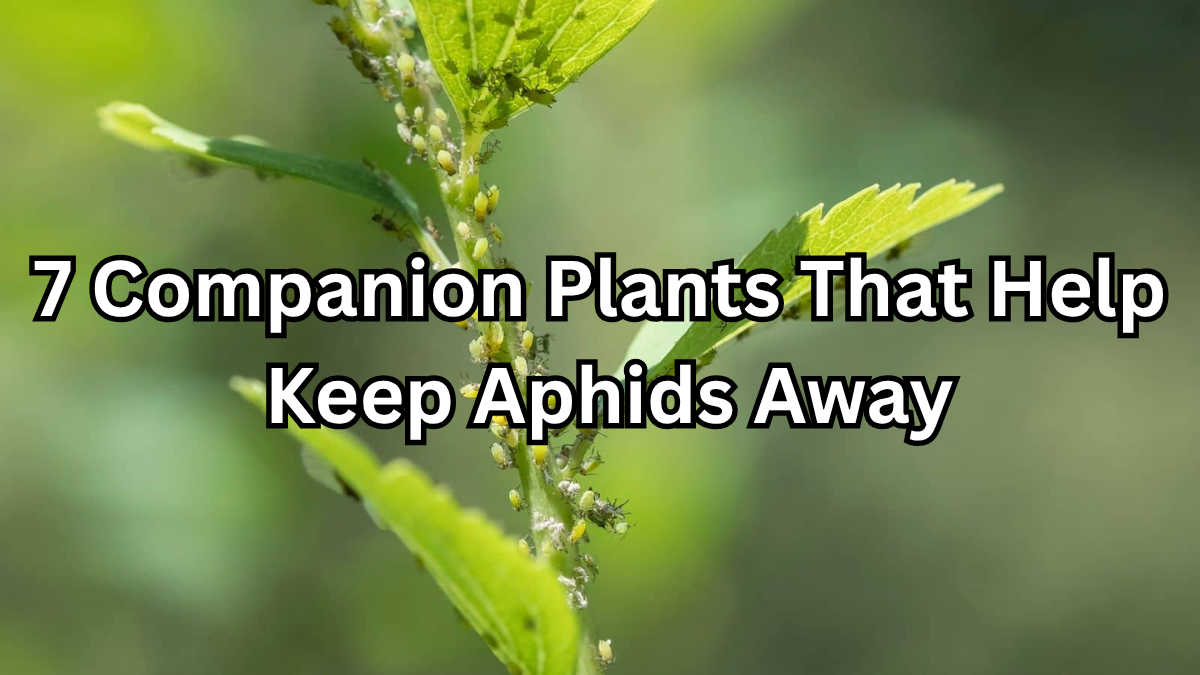Aphids are tiny pests, but they can cause major damage to your garden if left unchecked. These sap-sucking insects can stunt plant growth, spread diseases, and reduce yields. While chemical pesticides are an option, using aphid control plants and natural pest repellents is a safer, eco-friendly solution. Companion gardening is a smart way to naturally protect your plants by strategically planting species that repel aphids.
In this article, we’ll explore 7 effective companion plants that help keep aphids at bay, improve your garden’s health, and boost yields.

Why Use Aphid Control Plants?
Using plants to deter aphids has multiple benefits:
-
Eco-friendly: No harmful chemicals are needed.
-
Improves soil health: Companion plants often enrich the soil.
-
Attracts beneficial insects: Some companion plants attract ladybugs, lacewings, and other aphid predators.
-
Enhances garden productivity: Helps your main crops thrive naturally.
Marigolds
Marigolds are popular for their bright blooms, but they are also excellent for aphid control.
-
Releases a natural scent that repels aphids and other pests.
-
Can be planted alongside vegetables like tomatoes, peppers, and beans.
-
Helps attract beneficial insects like hoverflies, which feed on aphids.
Best paired with: Tomatoes, cucumbers, peppers
Pest repelled: Aphids, nematodes, whiteflies
Garlic
Garlic is a powerful natural pest repellent. Its strong aroma masks the scent of other plants, making it harder for aphids to locate their favorite hosts.
-
Plant near roses, carrots, and fruit trees.
-
Acts as a deterrent against aphids, spider mites, and Japanese beetles.
-
Can also improve the flavor of neighboring crops.
Best paired with: Roses, carrots, fruit trees
Pest repelled: Aphids, spider mites, beetles
Nasturtiums
Nasturtiums are considered a “trap crop” for aphids, meaning they attract aphids away from your main vegetables.
-
Soft-stemmed leaves attract aphids, keeping them off more valuable plants.
-
Edible flowers add color and flavor to salads.
-
Easy to grow and low-maintenance.
Best paired with: Cabbage, broccoli, cucumbers
Pest repelled: Aphids, whiteflies
Chives
Chives are a culinary herb that doubles as a pest deterrent.
-
Repels aphids from roses, tomatoes, and carrots.
-
Helps improve the growth and flavor of neighboring plants.
-
Can also attract pollinators like bees.
Best paired with: Roses, carrots, tomatoes
Pest repelled: Aphids, Japanese beetles
Basil
Basil isn’t just delicious in your pasta—it’s also an effective aphid control plant.
-
Strong scent repels aphids and mosquitoes.
-
Plant near tomatoes and peppers to enhance flavor and growth.
-
Can also attract beneficial insects like bees.
Best paired with: Tomatoes, peppers
Pest repelled: Aphids, mosquitoes
Mint
Mint’s strong aroma is highly effective in keeping aphids away.
-
Plant in pots to avoid invasive growth.
-
Great companion for cabbage, tomatoes, and peas.
-
Helps repel ants, which often protect aphids.
Best paired with: Cabbage, peas, tomatoes
Pest repelled: Aphids, ants
Rosemary
Rosemary is a hardy herb that works as a natural pest repellent.
-
Repels aphids and other flying pests.
-
Thrives in sunny, well-drained gardens.
-
Can be harvested for cooking or aromatherapy.
Best paired with: Beans, carrots, cabbage
Pest repelled: Aphids, carrot flies, cabbage moths
Vertical Table: Companion Plant Pairings for Aphid Control
| Companion Plant | Best Paired With | Pests Repelled | Additional Benefits |
|---|---|---|---|
| Marigolds | Tomatoes, Peppers, Cucumbers | Aphids, Whiteflies, Nematodes | Attracts beneficial insects |
| Garlic | Roses, Carrots, Fruit Trees | Aphids, Spider Mites, Beetles | Improves flavor of neighboring plants |
| Nasturtiums | Cabbage, Broccoli, Cucumbers | Aphids, Whiteflies | Acts as trap crop, edible flowers |
| Chives | Roses, Carrots, Tomatoes | Aphids, Japanese Beetles | Attracts pollinators |
| Basil | Tomatoes, Peppers | Aphids, Mosquitoes | Enhances growth and flavor |
| Mint | Cabbage, Peas, Tomatoes | Aphids, Ants | Strong aroma deters pests |
| Rosemary | Beans, Carrots, Cabbage | Aphids, Cabbage Moths, Carrot Flies | Can be harvested for cooking/aromatherapy |
Tips for Using Companion Gardening for Aphid Control
-
Mix flowering herbs and vegetables to create diverse gardens.
-
Avoid planting the same crops together repeatedly; rotate crops each season.
-
Encourage beneficial insects by planting flowers like dill, fennel, or yarrow.
-
Regularly check plants for early signs of aphids.
FAQs
1. Can companion plants completely eliminate aphids?
While companion plants significantly reduce aphid populations, they may not eliminate them entirely. They work best alongside other natural methods like encouraging predators and regular monitoring.
2. How often should I plant these aphid control plants?
Plant them at the start of the growing season and continue interspersing throughout your garden to maintain their repelling effects.
3. Are all herbs effective for aphid control?
Not all herbs repel aphids. Garlic, chives, basil, and rosemary are proven to work well, while others like parsley may have little effect.
4. Can companion gardening help with other pests?
Yes! Many companion plants repel multiple pests, attract beneficial insects, and even improve soil health, making your garden more resilient overall.
Click here to learn more
